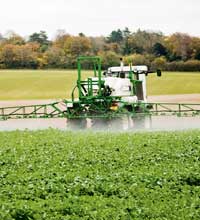Arguing over organic is ‘fruitless’, says top scientist

Farmers must stop squabbling over whether organic or conventional agriculture is most environmentally friendly, a leading scientist has warned.
Ian Crute said it was vital to reduce greenhouse gas emissions from all types of agriculture. “The notion that this is a case of organic farming good, conventional farming bad, doesn’t really get us anywhere,” he said.
The former director of Rothamsted Research made the comments as he prepared to take on a new role as the first chief scientist at the Agricultural and Horticultural Development board. He starts in the post on Tuesday (2 September).
In an exclusive interview with Farmers Weekly, Prof Crute said it was “completely fruitless” to try to paint one type of agriculture as better than the other. Both organic and conventional farming contributed to climate change, he said.
More investment in scientific research was needed to uncover better ways that agriculture could help to mitigate climate change. It was important to obtain numbers and adopt an analytical scientific approach to removing emissions.
“There is no good data which would say that the emissions of nitrous oxide from organic systems compared to systems which are using synthetic fertiliser are necessarily any worse or any better.”
Prof Crute acknowledged that organic agriculture did not use synthetic nitrogen, often using livestock manure instead. But there was no reason why synthetic nitrogen could not be produced from renewable inputs, he said.
Renewable electricity and renewable sources of hydrogen could be used to make nitrogen in a completely renewable way. “At the moment, we use natural gas primarily. But there’s nothing magic about renewability.”
So far as livestock systems were concerned, Prof Crute said livestock were clearly a source of greenhouse gas emissions in terms of methane, as well as a source of nitrogen pollution.
“I could argue very strongly that efficient pest, disease and weed control using pesticides was a far greener solution in terms of the efficiency with which nitrogen is used than an inefficient system using far more land and inputs inefficiently.”
Peter Melchett, Soil Association policy director, disagreed that organic production did not offer clear environmental benefits. “The environmental benefits of organic systems over conventional are clear,” he said. “It has a positive impact on wildlife and produces lower levels of pollution, mainly due to the absence of artificial chemicals and fertilisers.”
Farming’s impact on climate change was also reduced by organic production, he added. “Winter cover crops, shallow ploughing and increased organic matter from the use of manure increase soil carbon and reduce greenhouse gas emissions.”
But NFU policy director Martin Haworth endorsed Prof Crute’s comments. The NFU instinctively supported the call to spend more money on research and development into “market failure” issues, he said.
“We need to reduce greenhouse gas emissions from all systems and science is key. Producing more and impacting less was our message at this year’s NFU Conference and we are really pleased that it has been taken on.”

